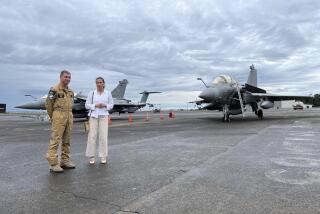Briefing Paper : Those Vital American Bargaining Chips in the Philippines
The News:
U.S. and Philippine negotiators will meet next Monday in Manila for what are called “exploratory talks” on the future of six U.S. military facilities in the country. . . . They include Clark Air Base and Subic Bay Naval Base, two of the Pentagon’s largest overseas bases. . . . President Corazon Aquino’s government has asked for the talks before any renegotiation of current leases, which expire in September, 1991.
The Background:
Relations between Washington and Manila are unusually strained. . . . In December, U.S. Air Force jets from Clark helped save Aquino’s government by pinning down attacking rebel planes near Manila during an attempted military coup. . . . But after critics said she was thus “beholden” to Washington, Aquino abruptly canceled a meeting in February with visiting U.S. Defense Secretary Dick Cheney, angering the Bush Administration.
Philippine politicians, meanwhile, are furious that Congress has refused to appropriate $96 million pledged under the current two-year, $962-million lease agreement. . . . Despite the shortfall, the United States claims that aid to Manila has exceeded commitments over the last five years.
At Issue:
The bases are considered crucial for U.S. military operations in the Pacific and Indian oceans. . . . Clark is headquarters for the 13th Air Force, with tactical fighter and airlift wings. Subic is home for the 7th Fleet and is a giant training, supply and repair depot. . . . About 12,000 U.S. troops are stationed in the Philippines; with civilian employees and families, the number rises to 40,000. . . . U.S. officials say the bases also provide jobs for 68,000 Filipinos and pump $1 billion into the economy.
Manila says the money isn’t enough. Also, opponents see the bases as a vestige of the time when the Philippines was a U.S. colony. . . . They blame the bases for spreading AIDS, prostitution and other social ills. And they argue that the bases make the Philippines a more likely target for nuclear attack.
Forces:
The debate over the bases dominates Manila’s newspapers, campuses and coffee shops like few other issues. . . . Although polls have shown that a majority of Filipinos support the bases, prominent politicians, church leaders and editorial writers are calling for the United States to pull out or sharply reduce operations. . . . Anti-base sentiment is strong in the 23-member Philippine Senate, which must ratify a new agreement.
The White House faces other pressures at home. A budget-strapped Congress, increasingly sour on Aquino’s government, is unlikely to up the ante for Manila, given competing demands from new democracies in Eastern Europe. And as the Soviet Union cuts its military forces worldwide, Pentagon strategists are re-examining the U.S. role in the Pacific. . . . Military officials who long insisted that the bases were vital to hold communism in check now say they are necessary to protect shipping lanes for Japan.
Personalities:
President Aquino says she is keeping her “options open” on the bases. Her hand is strengthened since she insists she won’t run for reelection in 1992, thus reducing domestic political pressure. . . . Her foreign minister, Raul Manglapus, will lead the talks. He is a smooth, savvy diplomat who has written an anti-bases musical called “Yankee Panky.”
Longtime Asian defense specialist Richard Armitage has been named special negotiator to head the U.S. team. . . . Armitage, 45, is a former assistant secretary of defense for international security affairs. . . . Embassy officials said the talks may last several months; a joint review, rather than renegotiation, of the agreement in 1988 took seven months.
Scenarios:
* The leases will simply be extended with no changes; this is considered very unlikely.
* There will be more joint use of the bases, as in NATO countries and Japan.
* U.S. forces will partially redeploy, particularly from Clark Air Base. The Pentagon has already studied possible alternatives for the Air Force in Singapore, Guam, Saipan and Tinian.
* The United States will carry out a phased withdrawal, spread over five to 10 years.
* In a combination of some of the above steps, the United States will slowly cut back its presence.
Big Stick in the Philippines
A look at personal figures, both military and civilian, for America’s two biggest bases in the Philippines.
Clark Air Base U.S. Military: 8,300 U.S. Civilian: 2,000 Filipinos: 38,000
Subic Bay Naval Base U.S. Military: 5,800 U.S. Civilian: 720 Filipinos: 37,000
More to Read
Sign up for Essential California
The most important California stories and recommendations in your inbox every morning.
You may occasionally receive promotional content from the Los Angeles Times.











